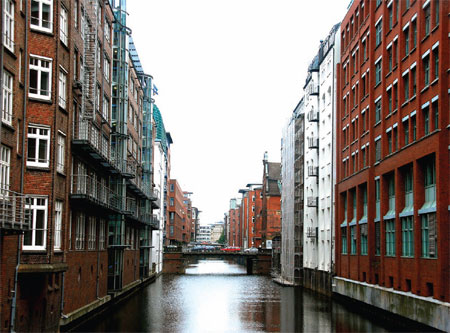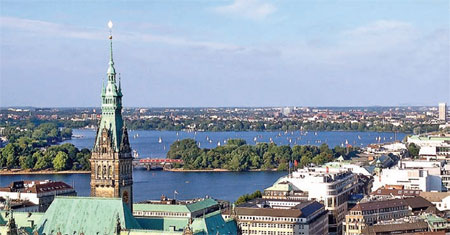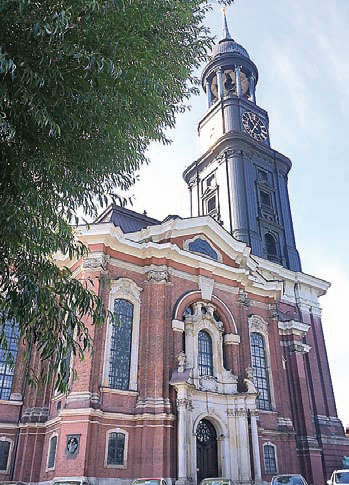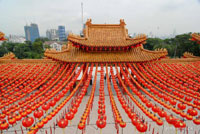Walking the streets of Hamburg
 |
|
Canals flow between office and residential buildings in Germany's Hamburg, often called the "Venice of Northern Europe". Photos by Amber Wu Ping / for China Daily |
 |
|
From St. Nikolai Memorial, visitors are rewarded by a stunning vista of Alster River and downtown Hamburg. |
 |
|
St. Pauli Church burned down in 1842, but was rebuilt through donations. |
Outside the plane window as we descended to Hamburg Airport I could spy a city surrounded by forests and it immediately felt like I was on holiday. There's plenty to see and do in Germany's second largest city, but all was quiet as I took a 15-minute stroll from my hotel to the harbor on an early Sunday morning.
The second largest port in Europe, situated on the Elbe River, spreads in front of me like a canvas. Ships from all over the world are gathered, mixing with local ferries and barges.
 |
The fish auction hall and paintings in souvenir shops along the harbor are reminders of its past glories as a major trading center.
I spot people carrying baskets of fruit and fish and come across a market that is full of vendors selling small seafood hamburgers, snacks and flowers. It is packed with a mix of locals, tourists and night owls, who arrive after partying in the nearby red-light district of the Reeperbahn.
A few blocks away, canals weave among offices and residential buildings, which is why the city is oft called the "Venice of Northern Europe".
Another classic walking tour in Hamburg starts at the Rathaus, or City Hall.
After the old City Hall was destroyed by fire in 1842, it took almost 44 years to build a new one, at a cost of around 80 million euros ($104 million) in today's currency.
Stepping into this neo-Renaissance sandstone building, there are exhibitions detailing the development and history of the city.
The second floor still maintains its original governmental functions with Renaissance-style offices and meeting rooms for Hamburg's parliament and senate.
|
 |
Meanwhile, in the city square, harbor and fish market, there are buskers everywhere and free concerts, making Hamburg a city of music.
On Sunday afternoon, I stumble upon a free rock concert where both the young and old enjoy the sunny weather, beer and music.
Walking south, I find myself surrounded by luxury boutiques and bustling shopping malls.
To the left of the bustling shopping area lies the beautiful Alster Lake, where I take a river cruise.
The captain and tour guide is obviously entertaining because everyone's laughing, though I can't understand much of what he's saying with my rudimentary German.
However, I'm equally entertained by the lively scenery outside the window, as locals take to their boats and even paddle surf.
Swans, ducks and geese bob on the blue water, lined by beautiful villas, where families barbecue or read in their courtyards.
Hamburg is the media capital of Germany. Walking to Baumwall after the cruise, there's a majestic ship-like building belonging to the publisher Gruner + Jahr (home to Stern and GEO magazine), part of Bertelsmann, the biggest media group in Europe.
Not far from G+J is St. Michaelis Church. It is the city's largest church and managed to survive the Allied bombings of World War II. The 132-meter high Baroque spire covered with copper has been a landmark for ships sailing up the river Elbe since it was constructed.














